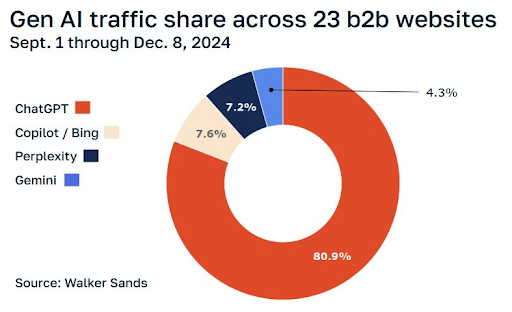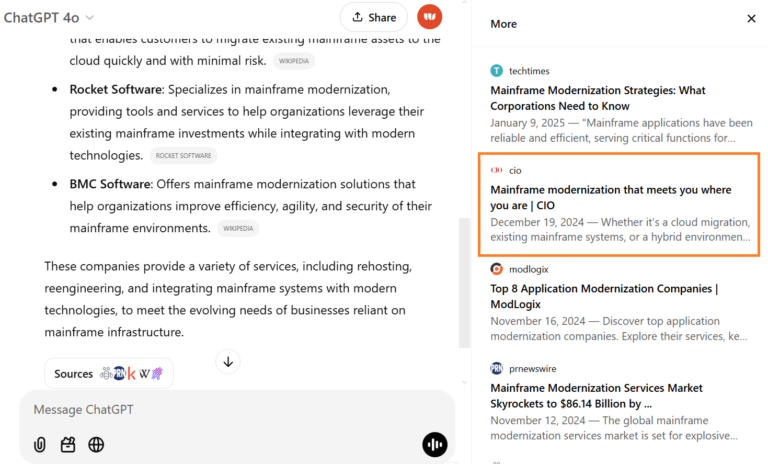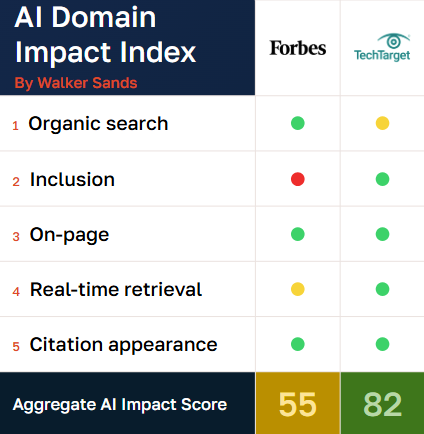TL;DR: we’ve developed a methodology to help answer this question: how likely is your earned media content to influence a Gen AI prompt response?
At Walker Sands, we’ve been closely watching a couple of trends in B2B search behavior that have a profound impact on Public Relations.
First is the gradual erosion of Google’s Search market share, which after more than a decade at > 90% has now fallen just under that threshold globally, and to 87% in the United States.
Second is the increasing traffic share Gen AI platforms are driving to B2B websites, which we’ve discussed on LinkedIn here and here (the number of people discovering, clicking through and taking action is roughly doubling every 100 days).

As search behavior evolves and the number of platforms on which people seek out answers, research and ideas is expanding, we’re seeing firsthand the real impact that exists at the intersection of what we typically think of as discrete marketing disciplines: search, content and PR.
As one example: In response to a prompt about which companies are active in IT mainframe modernization, ChatGPT names several it deems expert and cites multiple articles, including one in CIO.com.

Of course, comms professionals are quickly recognizing the role earned media has to play in training LLMs and ultimately informing and influencing those on the other end of the search.
But what’s the best way to gauge the impact of hundreds of earned and owned content pieces spread across many web domains, multiplied by the growing list of relevant LLMs and Gen AI platforms? At the highest level: how can a PR team make sense of all these inputs in order to clearly inform strategy? And at the most basic level: is a placement in Forbes or TechTarget more likely to influence a Gen AI prompt response?
For the past couple months, we’ve been working on a formula to do just that.
Introducing the AI Domain Impact Index
Developed by the team at Walker Sands, the AI Domain Impact Index (trademark pending) is a proprietary score assigned to any web domain on a 0 through 100 scale. A higher Impact Score indicates the relative likelihood that content on that web domain will contribute to a brand’s inclusion in Generative AI responses across multiple AI-powered platforms.
The Impact Score is made up of five weighted components:
- Organic Search: How often is the domain cited in Google AI Overviews and how prominent is the domain in organic search results?
- Inclusion: Are the website’s URLs explicitly excluded from access or training by LLMs and search engine bots?
- On-Page: How difficult is it for LLMs to actually read and contextualize the on-page content? Are the bots restricted from using the content?
- Real-time Retrieval: When real-time page-level analysis is needed, can Generative AI engines quickly access content and are they permitted to use it?
- Citation Appearance: How complete are the elements needed to display a generative AI citation?
To answer the very specific question posed above: at the time of writing, TechTarget has an Impact Score of 82 compared to Forbes’ 55, due in part to the fact that Forbes does not permit many of its URLs to be crawled by LLMs for either real-time access or training data.

To start, we envision the AI Domain Impact Index being used in two ways:
1) Planning: As media targets are developed for a program or campaign, Impact Score is one data point to consider when prioritizing specific outlets (not dissimilar from the way you might use Moz domain authority).
2) Measurement: When reporting on the impact of earned media coverage, Impact Score can be a useful metric to articulate progress toward training Gen AI platforms and, ultimately, getting a brand, products, value proposition or key messages in front of key audiences.
While we’re putting the finishing touches on the workflow surrounding the model, we will roll out the Index in the coming months to Walker Sands clients who are interested in being early adopters and testing and experimenting with us.
Based on its nature, the Impact Score for any particular domain is dynamic, not static, and will be refreshed periodically.
We look forward to sharing more soon. In the meantime, reach out if you’re interested in learning more about how the AI Impact Score can impact your PR or marketing program.



